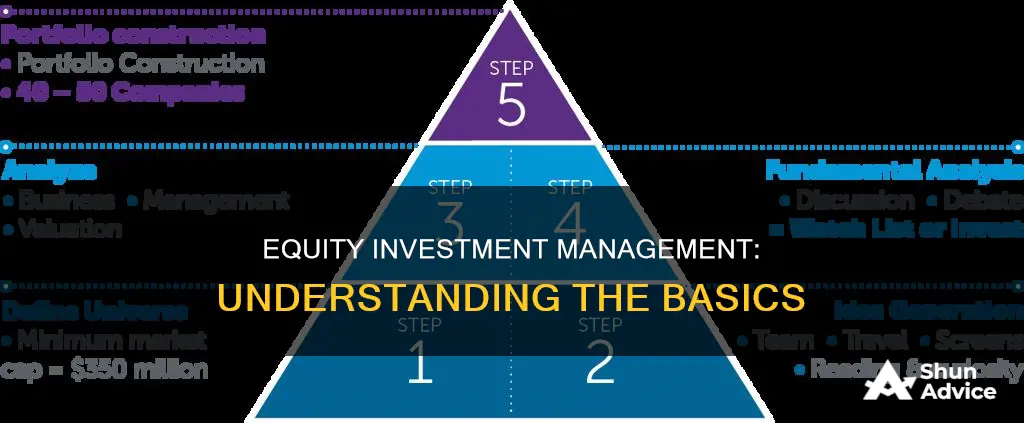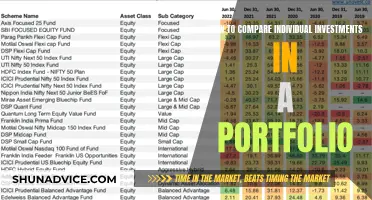
Equity investment management involves investors putting money into private or public companies by purchasing shares on the stock market. These shares are typically traded on a stock exchange, and investors become partial owners of the company according to the proportion of shares they own. Equity investment management is a traditional form of investment that many people are familiar with, and it offers the potential for higher returns than other asset classes such as bonds and cash. The main benefit of equity investment is the possibility of increasing the value of the principal amount invested, which comes in the form of capital gains and dividends.
| Characteristics | Values |
|---|---|
| Definition | Equity investment is money that is invested in a company by purchasing shares of that company in the stock market. |
| Benefits | The main benefit from an equity investment is the possibility to increase the value of the principal amount invested. This comes in the form of capital gains and dividends. |
| Risk | While there are many potential benefits to investing in equities, like all investments, there are risks as well. Market risks impact equity investments directly. Stocks will often rise or fall in value based on market forces. As a result, investors can lose some or all of their investment due to market risk. |
| Types | Common stocks, preferred stocks, stock warrants, equity lines of credit, convertible debt, restricted stock |
| Management | Equity portfolio management |
What You'll Learn

Equity investment funds
Equity funds can be categorised in several ways, including active and passive funds, market capitalisation, investment strategy, and sector or geographic specialisation. Active funds aim to outperform a benchmark index through the fund manager's expertise and various strategies, while passive funds aim to replicate the performance of a specific market index. Market capitalisation categorises funds based on the size of the companies they invest in, such as large-cap, mid-cap, or small-cap funds. Investment strategy categorises funds into growth and value funds, with growth funds investing in companies expected to have rapid earnings growth and value funds investing in undervalued stocks. Sector or geographic specialisation focuses funds on specific industries or regions.
Investing in equity funds offers benefits such as diversification, professional management, and the potential for superior returns. However, it also carries risks associated with stock market volatility and losses. When selecting an equity fund, it is important to consider factors such as investment objectives, risk tolerance, and time horizon, fund prospectus, performance, and fees, and tax implications.
Overall, equity investment funds provide a convenient way for investors to gain exposure to a diversified portfolio of stocks, offering the potential for higher returns compared to other asset classes.
Reviving Nature: Planting vs. Preservation, Where Should We Invest?
You may want to see also

Active vs passive funds
Equity investment management involves buying and selling shares of a company on the stock market, with the expectation that they will increase in value and generate dividends. This can be done through active or passive investing.
Active investors take a hands-on approach, regularly buying and selling stocks or other investments based on their short-term performance. They aim to beat the average returns of the stock market and take advantage of short-term price fluctuations. Active investing requires a portfolio manager or other active participant to oversee a team of analysts who look at qualitative and quantitative factors to decide when and if to buy or sell. It involves deeper analysis and expertise to know when to pivot into or out of a particular stock, bond, or asset.
Passive investors, on the other hand, rarely buy individual investments. They tend to hold investments over a long period or purchase shares of mutual or exchange-traded funds, relying on fund managers to ensure the investments held in the funds are performing. Passive investing involves less buying and selling and often results in investors buying indexed or other mutual funds. This strategy requires a buy-and-hold mentality, where investors select stocks or funds and resist the temptation to react to the stock market's moves. The prime example of a passive approach is buying an index fund that follows a major index like the S&P 500 or Dow Jones Industrial Average.
Both active and passive investing strategies have their advantages and disadvantages. Active investing offers more flexibility, as managers can buy stocks they believe are "diamonds in the rough" and are free to use hedging strategies such as short sales or put options. They can also use tax management strategies tailored to individual investors. However, active investing is very expensive due to the high expense ratios and transaction costs associated with active buying and selling.
Passive investing, on the other hand, offers ultra-low fees, transparency, and tax efficiency. Because passive funds simply follow an index, oversight is much less expensive. There is also good transparency, as investors always know which assets are in an index fund. However, proponents of active investing argue that passive strategies are too limited, offering little to no variance, and tend to result in small returns as they are locked into tracking the market.
While passive investing has been more prevalent among retail investors, active investing has become increasingly popular, especially during market upheavals. Many investment advisors believe that blending the two strategies can help minimize the wild swings in stock prices during volatile periods and further diversify a portfolio.
Creating Your First Investment Portfolio: A Beginner's Guide
You may want to see also

Equity portfolio management
Understanding Equity Portfolios
Equities form a significant part of the global investment landscape and are a primary component of investors' portfolios. They offer potential participation in economic growth, corporate earnings, and ownership interests in diverse business entities. Publicly traded equities are highly liquid, enabling investors to monitor price trends and execute transactions with ease. Equity portfolio management involves understanding the roles of equities in a portfolio, from capital appreciation and dividend income to diversification and inflation hedging.
Segmenting the Equity Investment Universe
The equity investment universe is vast and can be segmented in several ways. Commonly, investors categorise equities based on size and style, geography, and economic activity. This segmentation helps define investment mandates and strategies.
Income and Costs in Equity Portfolios
Equity portfolios generate income through dividends, securities lending fees, dividend capture, covered calls, and cash-covered puts. However, there are also costs associated with managing these portfolios, including management fees, performance fees, administration fees, marketing and distribution fees, and trading costs.
Shareholder Engagement
Shareholder engagement is a critical aspect of equity portfolio management, where investors actively communicate and collaborate with the companies they invest in. This process includes voting on corporate matters, participating in general meetings, and engaging in other forms of communication, such as investor calls or in-person meetings. Shareholder engagement benefits both parties, as it fosters effective corporate governance and enhances company performance, ultimately translating to improved shareholder returns.
Active vs. Passive Management
The decision to pursue active or passive management of an equity portfolio is not binary but rather exists on a spectrum. Investors position their portfolios along this spectrum based on factors such as their confidence to outperform, client preferences, suitable benchmarks, client-specific mandates, risks and costs of active management, and tax considerations.
The Role of Portfolio Managers
Portfolio managers play a pivotal role in equity portfolio management. They are responsible for understanding the investment philosophy and constraints of their firm, such as market capitalisation guidelines and selection styles. Additionally, portfolio managers must consider tax consequences, as taxable portfolios require careful attention to holding periods, capital gains, capital losses, and dividend income. Building and maintaining a portfolio model is essential, allowing managers to standardise portfolios and optimise returns.
In summary, equity portfolio management entails a comprehensive understanding of equity analysis, modern portfolio theory, and the practical application of these concepts. By constructing and managing portfolios effectively, portfolio managers aim to generate strong returns while adhering to client objectives and constraints.
Strategic Investment Portfolio Management: A Comprehensive Guide
You may want to see also

Equity fund pros and cons
Equity investment management involves raising capital for a business by selling shares in that business. This can be done through private equity investments or by selling shares on the stock market. Here are some pros and cons of equity fund investments:
Pros of Equity Funds
- Potential for high returns: Equity funds offer investors the potential for high returns in the form of capital gains and dividends. If the company performs well, the value of the investor's shares will increase, resulting in capital gains. Additionally, investors may receive dividends, which are distributions of the company's profits.
- Diversification: Equity funds provide investors with a diversified portfolio of stocks across various sectors and industries. This diversification can help reduce risk by spreading investments over multiple companies, industries, and markets.
- Professional management: Equity funds are typically managed by professional fund managers who have expertise in investing and financial markets. These managers research and analyse companies, make investment decisions, and monitor the performance of the fund's holdings. This active investment strategy can be beneficial for investors who may not have the time or expertise to manage their investments actively.
- Lower minimum investment: Equity funds usually have a lower minimum initial investment amount compared to investing directly in stocks. This makes it more accessible to a wider range of investors, allowing them to invest in a diversified portfolio with a smaller amount of capital.
- Voting rights and influence: Equity fund investors typically have voting rights, which means they can vote on important matters such as the election of the board of directors. Additionally, if an investor accumulates a large enough stake in a company, they may gain influence over management decisions and the direction of the company.
Cons of Equity Funds
- Market risk: Equity funds are subject to market risk, which means their value can fluctuate with changes in the stock market. If the market experiences a downturn, the value of the equity fund may decline, resulting in potential losses for investors.
- Credit and liquidity risk: There is a risk that the companies in which the equity fund invests may struggle financially and be unable to pay their debts or meet their short-term financial obligations. This can negatively impact the fund's performance and the value of the investor's holdings.
- Foreign currency and political risk: Investments in companies operating in different countries expose equity funds to foreign currency risk and political risk. Changes in exchange rates or political instability can affect the value of the fund's investments.
- Economic concentration risk: If an equity fund is heavily concentrated in a single entity, sector, or country, it may face a higher risk of loss if that particular area experiences negative events or economic downturns.
- Fees and expenses: Equity funds typically charge management fees and other expenses, which can impact the overall returns of the investment. These fees may include expense ratios, sales loads, and redemption fees, among others.
- Lack of control: While equity fund investors may have voting rights, they generally do not have direct control over the day-to-day operations and management decisions of the companies in which the fund invests.
It is important to note that the specific pros and cons of equity funds can vary depending on the fund's investment strategy, the companies it invests in, and the overall market conditions. Conducting thorough research and understanding the risks involved is crucial before making any investment decisions.
Portfolio Investment Strategies: A Guide for Class 12 Students
You may want to see also

Equity fund tax implications
Taxation on Dividends
Dividends are a portion of the profits distributed to investors by mutual fund houses. Previously, companies paid dividend distribution tax (DDT) before paying dividends, and investors were exempt from paying taxes on dividend income. However, amendments to tax laws have changed this. Now, dividends received by investors are added to their taxable income and taxed at their respective income tax slab rates. Additionally, the Mutual Fund scheme's dividend is subject to TDS (tax deducted at source). The fund manager is required to deduct TDS under Section 194K from the dividend distributed to investors if the total dividend paid to an investor during a financial year exceeds a certain threshold, which may vary by jurisdiction.
Taxation on Capital Gains
Capital gains refer to the profits realised when investors sell their capital assets at a higher price than their total investment amount. The taxation rate on capital gains depends on the type of mutual fund and the holding period.
Short-Term Capital Gains
If you redeem your equity fund units within a short holding period, usually defined as less than one year, you will realise short-term capital gains. These gains are typically taxed at a flat rate, such as 15% or 20%, irrespective of your income tax bracket.
Long-Term Capital Gains
Long-term capital gains are realised when you sell your equity fund units after holding them for a specified period, usually over one year. In some jurisdictions, long-term capital gains below a certain threshold, such as Rs 1 lakh or Rs 1.25 lakh per year, are tax-exempt. Any long-term capital gains exceeding this limit attract LTCG tax, typically taxed at a rate of 10% to 12.5%, without indexation benefit.
Securities Transaction Tax (STT)
In addition to taxes on dividends and capital gains, there may be a Securities Transaction Tax (STT) levied by the government when you buy or sell units of an equity fund or a hybrid equity-oriented fund. The STT rate is typically very low, such as 0.001%. It is important to note that STT may not apply to the sale of debt fund units.
Tax Efficiency of Mutual Funds
Mutual funds are often considered tax-efficient investment vehicles compared to other options. For example, investing in fixed deposits can be disadvantageous if you fall under the highest income tax bracket, as the interest is added to your taxable income and taxed at a higher rate. Mutual funds, on the other hand, can provide tax-efficient returns, making them a popular choice for investors.
Diversified Investment Portfolios: Strategies for Optimal Returns
You may want to see also
Frequently asked questions
Equity investment management involves the professional management of a portfolio of equity investments, such as stocks or shares, on behalf of investors. The goal is typically to generate returns and capital gains for investors while managing risks.
Equity investment management offers several benefits, including:
- Diversification: Equity funds invest in a wide range of stocks across different sectors and industries, reducing the risk associated with investing in individual stocks.
- Professional management: Experienced fund managers actively research, analyse and select stocks, aiming to outperform the market or a specific benchmark.
- Potential for superior returns: Historically, stocks have offered higher returns than other asset classes like bonds and cash. Equity investments provide an opportunity to increase the value of the original investment through capital gains and dividends.
The main risk associated with equity investment management is market risk, which includes economic downturns, geopolitical events, and changes in investor sentiment. During periods of market volatility, equity fund prices can fluctuate significantly, potentially leading to short-term losses. Other risks include credit risk, foreign currency risk, liquidity risk, and political risk.







